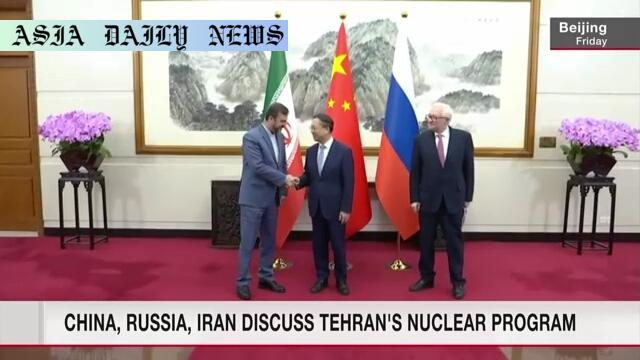Sanctions: A joint statement from China, Russia, and Iran urges the removal of unlawful US sanctions and emphasizes diplomatic solutions.
- Sanctions stand as the focal point in the tri-nation discussion involving China, Russia, and Iran.
- The nations called on the US to eliminate unlawful unilateral sanctions over Iran’s nuclear development program.
- The joint statement highlights the importance of diplomacy in resolving international conflicts and tensions.

Understanding the Focus on Sanctions
The recent tripartite discussions among China, Russia, and Iran brought the issue of US-imposed sanctions against Iran into sharp focus. The meeting, held in Beijing, called for an immediate end to all unilateral and unlawful sanctions imposed on Tehran, particularly concerning its nuclear development program. Despite pressure exerted by the US, including threats of increased sanctions, Iran continues to fiercely guard its nuclear ambitions, criticizing Washington for its actions and demands. This session appeared to be a direct response to earlier statements by US President Donald Trump, urging Iran to engage in negotiations on its nuclear activities.
The joint statement emerging from the discussions reflects the collective stance of these nations. It emphasizes the importance of diplomatic efforts while condemning the US’s use of sanctions, pressure tactics, and threats of force. Through their call to address the ‘root causes’ of the nuclear issue, the nations underscored their alignment against what they perceive as unwarranted aggression by the US.
The Role of Multilateral Cooperation
Significantly, this meeting further highlighted the strategic cooperation between China, Russia, and Iran in navigating contemporary geopolitical challenges. By addressing both regional and international issues, the three nations portrayed a united front to counter the Trump administration’s aggressive strategies. The collaboration serves as a testament to how shared adversarial relations with Western powers can foster close alignment among nations with different domestic policies and international goals.
In addition to discussing sanctions, the representatives seized the opportunity to exchange insights into broader global issues. Topics likely included shared security concerns, economic collaboration, and ways to strengthen their collective hold in international logistics and supply chain systems in the face of Western-dominated narratives. This collaboration underscores the high stakes of international diplomacy and the significance of dialogue in overcoming confrontational policies.
Implications for the Global Order
The collective insistence of China, Russia, and Iran for the removal of unilateral sanctions could have far-reaching implications for the existing global order. Their alignment challenges the traditional power dynamics that have been heavily influenced by US policies. This demand for the cessation of American unilateral sanctions introduces a significant test for US foreign policy and its standing in the international arena.
The reliance on sanctions as a dominant foreign policy tool by the US has often sparked criticisms of economic imperialism. The united stand by China, Russia, and Iran against what they perceive as unjust interventions re-ignites debates over the legality and morality of sanctions. In essence, this signifies a geopolitical shift where emerging powers are leveraging collective bargaining to counter Western policies more effectively.



Commentary
The Growing Challenge of Unilateral Sanctions
The recent negotiations among China, Russia, and Iran highlight a pivotal moment in international relations. Sanctions, as a tool of foreign policy, have often been criticized as instruments of control rather than diplomacy. Events like these underline the growing global call to push back against what is perceived as unjust economic pressure, particularly when it is aimed unilaterally. This changing narrative reflects the frustrations of nations subjected to these sanctions, sparking conversations about fairness and equal footing in international diplomacy.
The Need for Diplomatic Solutions
The joint emphasis on the necessity of dialogue and diplomacy is worth noting. While sanctions aim to compel nations to adhere to certain global norms, they often result in alienation instead of compliance. For diplomacy to thrive, it is essential to prioritize discussions that are inclusive and respectful of the individual perspectives each stakeholder brings to the table. The collaborative tone among China, Russia, and Iran is a signal of their intent to achieve constructive resolutions without resorting to punitive measures.
Shifting Alliances in a Multipolar World
Perhaps the most intriguing aspect of this scenario is the evolving global power dynamics. With China and Russia backing Iran, the traditional US-led international order faces a challenge. It signals an amplified effort by these countries to foster their influence in global policymaking. As the world transitions into a multipolar order, alliances and partnerships forged under shared adversarial relations could reshape many dynamics of international engagement. With this shift, the role of sanctions as a governing mechanism in geopolitics may need thorough reconsideration.